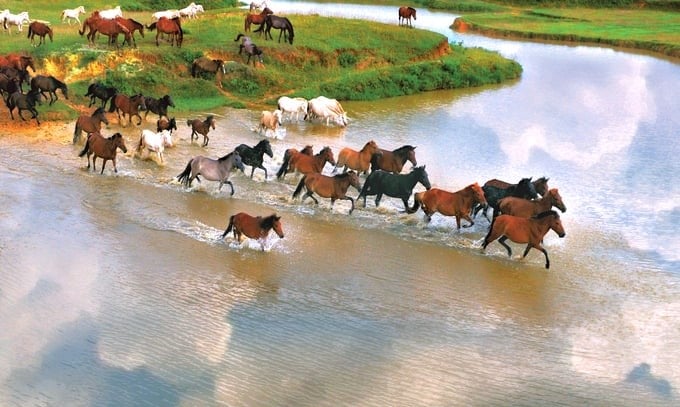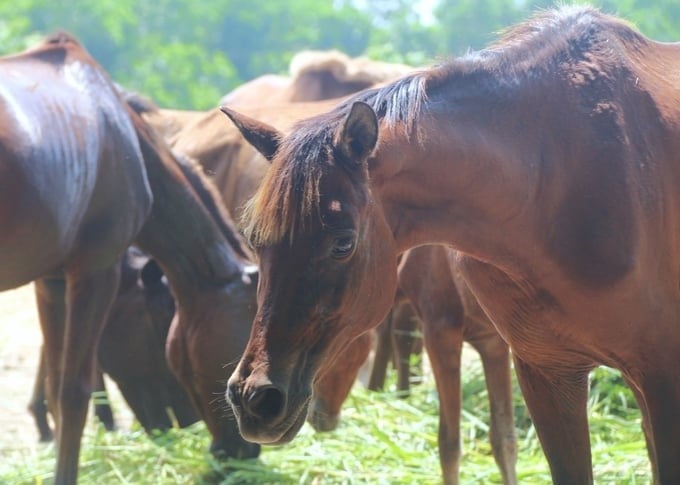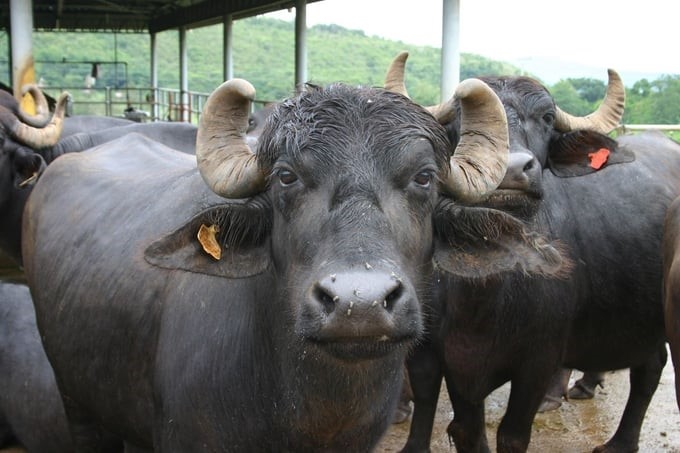May 19, 2025 | 02:50 GMT +7
May 19, 2025 | 02:50 GMT +7
Hotline: 0913.378.918
May 19, 2025 | 02:50 GMT +7
Hotline: 0913.378.918

Horse hooves on Ba Van Hill. Photo: Pham Hieu.
Ba Van horse breeding farm (now called the Animal Husbandry Research and Development Center for Mountainous Zone in Binh Son commune, Song Cong city, Thai Nguyen province) was established in April 1960 to research and transfer horse farming technology to serve the lives and production of ethnic people in the Northern mountainous region.
During the process since its establishment, the Center has gone through many challenges and hardships, along with the country's general difficulties. Despite researching livestock specific to mountainous areas and located in an area with difficult economic, social, and traffic conditions, the Center still makes a major contribution to the cause of agricultural and rural development in general, and especially the horse and buffalo farming industry in mountainous areas in particular.
Now, mentioning the Animal Husbandry Research and Development Center for Mountainous Zone means mentioning the largest research and storage unit of horse and buffalo genetic resources in the country. Because its predecessor was Ba Van Horse Breeding Farm, the Center has many years of experience in researching and developing horse breeds in Vietnam.
Previously, the horse was closely associated with the lives of ethnic people in the Northern mountainous region. In people's daily lives, horses are a means of carrying goods and a tool for plowing fields and pulling carts. And thus, the demand for horse breeds to serve people's daily lives is so huge.
In particular, border guards also use horses as a means of patrolling and guarding, so it can be said that horses also play an important role in national defense and security. Until now, many border guard units at the borders of Dien Bien, Ha Giang, and Cao Bang provinces still ride horses to patrol and guard the border.
Although traffic is now more convenient and vehicles are more modern, in highland border areas, where roads are still difficult, horses are still a valuable asset for mountain people.

Because its predecessor was Ba Van Horse Breeding Farm, the Center has many years of experience in researching and developing horse breeds in Vietnam. Photo: Pham Hieu.
In previous periods, the support work of the Animal Husbandry Research and Development Center for Mountainous Zone in the process of raising and caring for horses for people was very difficult.
The reason comes from the fact that most horse-farming households live in remote areas with difficult transportation and a lack of electricity, roads, schools, medical centers, and material facilities. There are even areas where there is no other way to get there than by walking. In those days, each business trip of the Center's staff lasted weeks, even months.

Murrah buffalo breeds are being cared for and kept by the Center. Photo: Pham Hieu.
At that time, Mr. Ta Van Can, Deputy Director of the Animal Husbandry Research and Development Center for Mountainous Zone, was just a young, newly-graduated engineer.
Starting to work at the Center in 1998, that young engineer carried a passionate fire and youthful energy burning in his chest, packed his backpack, and went on a business trip for months to jointly eat and drink and share techniques and experiences in taking care of cattle herds with highland people.
Mr. Can shared with the Vietnam Agriculture Newspaper about his memorable business trip, which was a business trip to Trung Khanh district, Cao Bang province, in 2000. At that time, he was sent by the Center to support and take care of a sick horse for the people.
Ironically, that young engineer had never been trained in horse-related knowledge because he majored in animal husbandry and veterinary medicine at the University of Agriculture III (now called Thai Nguyen University of Agriculture and Forestry). For a young officer with all the experience and knowledge only located on the pages of books, the horse is a great and extremely valuable asset to the people, so he could not avoid being worried.
Therefore, before going on a business trip, he had to read a lot of documents to better understand horses and be able to convey that knowledge and experience to people, especially folk experiences and tips for treating horses.
“That time I encountered a case of a people's horse having a stomach ache. The first time I contacted and had to control a horse, I was very shaken and worried because an adult horse is very strong. If I do not know how to control it, I will not be able to keep it," Mr. Ta Van Can recalled.
Applying the knowledge that he had read, the engineer was finally able to control the horse for easier care. At the same time, he also shared those experiences with people. First, in order to control a horse, it is mandatory to hang one leg up because the horse will lose balance and stand still. Second, the horse's upper lip must be twisted tightly to control the horse because that is an area where many nerve endings are concentrated. With those two steps, the horse will stand completely still, so the owner can take care of its health.

Staff of the Center inseminate for horses: Pham Hieu.
“At that time, if people were happy, I was happier because I felt that the knowledge I had learned could be applied in practice and my work could help people. More particularly, as an officer representing the Center, which is considered the cradle of the horse farm, I felt proud not only for myself but also for the whole unit because the position of Ba Van horse farm in the eyes of people has been raised. Although the work was hard, I was rewarded with the people’s love and trust," Mr. Can emotionally shared.
It has been more than 20 years since that memorable business trip, but in the eyes of the leader of the Animal Husbandry Research and Development Center for Mountainous Zone, emotional recovery still shines. It seems that the young engineer's passionate fire and love for his profession still burn forever in his heart.
In 2020, Mongolia donated a herd of 100 horses to Vietnam's Cavalry Mobile Police Corps. The Ministry of Public Security decided to choose the land area on Ba Van Hill under the Animal Husbandry Research and Development Center for Mountainous Zone as the "headquarters" for the Cavalry Mobile Police Corps.
Here, the delegation received support and imparted experience and knowledge from experts at the Center, which has a history of more than 60 years of farming and researching large cattle for medical and veterinary purposes, with two main species of buffalo and horses.
The Center and the Cavalry Mobile Police Corps have signed a memorandum of understanding to cooperate in exchanging experiences, science, and technology in horse farming so that the Mongolian horse herd can adapt to the climate and living conditions in Vietnam. Up to now, the Mongolian horse herd has grown healthy, big, and beautiful, ready to serve the unit's functions and tasks.
Translated by Huyen Vu Thu

(VAN) Minister of Agriculture and Environment Do Duc Duy held a meeting with Soopakij Chearavanont, Chairman of C.P. Group, on May 15.
/2025/05/16/3800-0-nongnghiep-143756.jpg)
(VAN) Suntory PepsiCo Vietnam coordinated with the Ministry of Education and Training to implement an education program on water conservation, reaching nearly 1 million primary school students nationwide.

(VAN) Vietnam’s TH Group officially put its high-tech fresh milk processing plant into operation in the Russian Federation, marking a historic moment as the first TH true MILK cartons were produced in Russia.

(VAN) Use of high-quality broodstock and biotechnology is regarded as the most effective approach to ensuring sustainable and economically viable shrimp aquaculture ahead of climate change and the emergence of increasingly intricate disease patterns.

(VAN) Carbon farming is a form of agricultural practices that helps absorb more greenhouse gases than it emits, through smart management of soil, crops, and livestock.

(VAN) This is a key content of the Memorandum of Understanding recently signed between the Vietnam Fisheries Society and Kunihiro Inc of Japan.

(VAN) To achieve the goal, local authorities and businesses in Kon Tum province have fully prepared the necessary conditions for the new Ngoc Linh ginseng planting season.